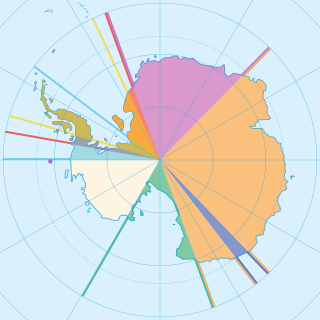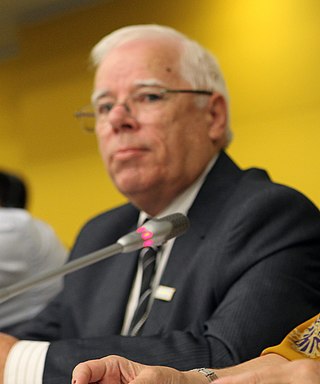The Nootka Sound Conventions were a series of three agreements between the Kingdom of Spain and the Kingdom of Great Britain, signed in the 1790s, which averted a war between the two countries over overlapping claims to portions of the Pacific Northwest coast of North America.

The Beagle conflict was a border dispute between Chile and Argentina over the possession of Picton, Lennox and Nueva islands and the scope of the maritime jurisdiction associated with those islands that brought the countries to the brink of war in 1978.
Sovereignty over the Falkland Islands is disputed by Argentina and the United Kingdom. The British claim to sovereignty dates from 1690, when they made the first recorded landing on the islands, and the United Kingdom has exercised de facto sovereignty over the archipelago almost continuously since 1833. Argentina has long disputed this claim, having been in control of the islands for a few years prior to 1833. The dispute escalated in 1982, when Argentina invaded the islands, precipitating the Falklands War.

The Falkland Islands is an archipelago in the South Atlantic Ocean on the Patagonian Shelf. The principal islands are about 300 mi (480 km) east of South America's southern Patagonian coast and about 752 mi (1,210 km) from Cape Dubouzet at the northern tip of the Antarctic Peninsula, at a latitude of about 52°S. The archipelago, with an area of 4,700 sq mi (12,000 km2), comprises East Falkland, West Falkland, and 776 smaller islands. As a British overseas territory, the Falklands have internal self-governance, but the United Kingdom takes responsibility for their defence and foreign affairs. The capital and largest settlement is Stanley on East Falkland.
There were many events leading to the 1982 Falklands War between the United Kingdom and Argentina over possession of the Falkland Islands and South Georgia.

The Falkland Islands have a complex history stretching over five hundred years. Active exploration and colonisation began in the 18th century but a self-supporting colony was not established till the latter part of the 19th century. Nonetheless, the islands have been a matter of controversy, as due to their strategic position in the 18th century their sovereignty was claimed by the French, Spaniards, British and Argentines at various points.

Foreign relations between the Argentine Republic and the United Kingdom of Great Britain and Northern Ireland have existed for over a century.

Seven sovereign states – Argentina, Australia, Chile, France, New Zealand, Norway, and the United Kingdom – have made eight territorial claims in Antarctica. These countries have tended to place their Antarctic scientific observation and study facilities within their respective claimed territories; however, a number of such facilities are located outside of the area claimed by their respective countries of operation, and countries without claims such as China, India, Italy, Japan, Pakistan, Russia, South Africa (SANAE), Poland, and the United States have constructed research facilities within the areas claimed by other countries. There are overlaps among the territories claimed by Argentina, Chile, and the United Kingdom.

British sovereignty of South Georgia and the South Sandwich Islands is disputed by Argentina. The United Kingdom claimed South Georgia in 1775, annexed the islands in 1908, and has exercised de facto control with the exception of a brief period during the Falklands War in 1982, when the islands were partially controlled by Argentina. The dispute started in 1927 when Argentina claimed sovereignty over South Georgia, and subsequently expanded in scope with Argentina claiming the South Sandwich Islands in 1938. The islands have no indigenous population, and currently only have about 30 inhabitants.

The papal mediation in the Beagle conflict followed the failure of negotiations between Chile and Argentina, when, on 22 December 1978, the Argentinian Junta started Operation Soberanía, to invade Cape Horn and islands awarded to Chile by the Beagle Channel Arbitration. Soon after the event, Pope John Paul II offered to mediate and sent his personal envoy, Cardinal Antonio Samoré, to Buenos Aires. Argentina, in acceptance of the authority of the Pope over the overwhelmingly Catholic Argentine population, called off the military operation and accepted the mediation. On 9 January 1979, Chile and Argentina signed the Act of Montevideo formally requesting mediation by the Vatican and renouncing the use of force.

The Treaty of Peace and Friendship of 1984 between Chile and Argentina was signed into agreement at the Vatican on 29 November 1984.
Rodolfo Irazusta was an Argentine writer and politician who was one of the leading lights of the nationalist movement of the 1920s and 1930s. He collaborated closely with his younger brother Julio Irazusta throughout his career.

The Falklands Expedition occurred in late 1831 when the United States Navy warship USS Lexington was dispatched to investigate the seizure of three whalers at the settlement of Puerto Luis founded in the ruins of the former Spanish penal colony of Puerto Soledad by Luis Vernet. Vernet had sought to control sealing in the islands and seized the ships alleging they had violated his regulations controlling sealing in the islands. Finding one of the ships being outfitted with guns, Captain Duncan had entered of Puerto Soledad on December 28, 1831, under French Flag Captain Duncan invited Vernet's second and who had more authority in the colony at that time, Matthew Brisbane and Enrique Metealf, as an official courtesy visit. He gave the invitation to a lieutenant who had approached in a boat while they were strolling along the beach. They later learned that it was a United States warship arriving to demand reparations for captured schooners.
In the late 1840s, the Argentine Confederation attempted to regulate traffic on the Paraná and Uruguay rivers, which impacted upon Anglo-French trade with the landlocked Paraguay. As a result, Britain and France took military action in the blockade of the Río de la Plata. Although militarily successful, the victories against Argentine forces proved somewhat pyrrhic and both withdrew their forces and made treaties with Argentina. The peace treaty with the British is referred to as the Convention of Settlement; or the Arana–Southern Treaty.
A referendum on political status was held in the Falkland Islands on 10–11 March 2013. The Falkland Islanders were asked whether or not they supported the continuation of their status as an Overseas Territory of the United Kingdom in view of Argentina's call for negotiations on the islands' sovereignty.

José María Pinedo was a commander in the navy of the United Provinces of the River Plate, one of the precursor states of what is now known as Argentina. He took part in the Argentine War of Independence, the Argentine Civil Wars and the Cisplatine War. He is also known for failing to resist the British return to the Falkland Islands in 1833.
The United Nations General Assembly Resolution 2065 was a non-binding resolution adopted on 16 December 1965 that recognized the existence of a sovereignty dispute between the United Kingdom and Argentina over the Falkland Islands. The resolution invites the parties to find a peaceful solution to the dispute.

Alejandro Jacobo Betts was a Falklands-born Argentine air-traffic controller and activist who worked with the Argentine government as a technical advisor on the Tierra del Fuego's Malvinas Question Provincial Observatory Advisory Council. Betts supported Argentina's claim to the Falkland Islands and was a controversial figure in the Falklands as a result. Betts also was the older brother of Terry Betts, who served as a member of the Falkland Islands Legislative Council and assisted British forces in the Falklands War. His younger brother Peter served in the British Task Force.

The hijacking of Aerolíneas Argentinas Flight 648 occurred on 28 and 29 September 1966 when a group of Argentine nationalists hijacked a civilian Aerolíneas Argentinas aircraft en route from Buenos Aires to Río Gallegos and forced the captain at gunpoint to land in the Falkland Islands in protest to the UK's presence on the islands. After landing, the hijackers raised the Argentine flag, took several islanders hostage and demanded the Governor of the Falkland Islands recognise Argentine sovereignty over the islands. On 29 September 1966, after negotiating through a Catholic priest, the hijackers surrendered and were returned to Argentina for trial.











